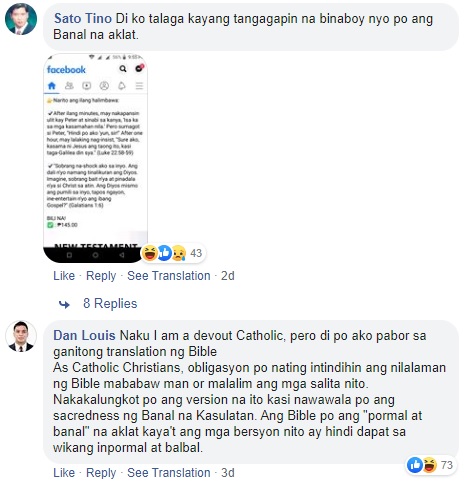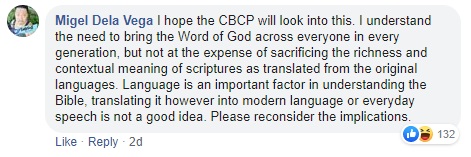Catholic bookstore St. Paul’s Online assured the public that the “Pinoy version” of the New Testament bible remained faithful to its Greek roots following mixed cheers and jeers from the public.
St. Paul recently released a book titled “New Testament: Pinoy Version” wherein the biblical verses are written in Taglish, the modern vernacular of combined Filipino and English languages, to attract the younger audiences.
The announcement, however, did not please the Catholic faithful online and drew negative reactions from them instead.
Following the wave of criticisms, last Sunday, St. Paul’s Online shared a clarification via a series of infographics and highlighted that the texts of the translated version remained “faithful” to the United Bible Societies New Testament 5th edition. The latter served as the basis for most modern Bible translations.
“Ito ay faithful o tapat sa nilalaman ng UBS Greek New Testament 5th edition na siyang textual base nito. Wala itong pagkiling o bias sa doktrina ng alin mang religious group dahil faithful ito sa original text,” one of the infographics read.
Here are some additional information on the New Testament Pinoy Version. Hango ang mga paliwanag na ito sa mismong…
Posted by St Pauls Online on Sunday, August 16, 2020
The book, which was the newest edition published by the Philippine Bible Society, underwent a dynamic or meaning-based translation approach.
“Dito, pinapalabas ng translation ang kahulugan ng Greek text at hindi ang anyo nito,” the infographics read.
Different churches in the country also helped in producing this book as part of an agreement called the interconfessional project.
In 1968, the Secretariat for Promoting Christian Unity and the UBS created guidelines for this pact called “Guiding Principles for interconfessional cooperation in translating the Bible.”
The shift in the youth’s popular speech prompted PBS to launch this project. They sought to help bring the “Word of God” closer to them.
“Kaya bilang kabataan tayo ay inaanyayahan na basahin ang Pinoy NT para mas maintindihan ang salita ng Diyos at magamit natin ito sa paglago ng ating pananampalataya, relasyon sa ating kapwa at higit sa lahat ang ating relasyon sa Diyos,” the store said.
Online buzz on Taglish New Testament
St. Paul’s Online announced the book’s release in a statement on Facebook last Friday, August 14.
𝐀𝐕𝐀𝐈𝐋𝐀𝐁𝐋𝐄 𝐍𝐀⁉️⁉️ ang 𝐍𝐄𝐖 𝐓𝐄𝐒𝐓𝐀𝐌𝐄𝐍𝐓 𝐏𝐢𝐧𝐨𝐲 𝐕𝐞𝐫𝐬𝐢𝐨𝐧.☑️✅Sa bersiyon na ito, ginamitan ng Taglish o pinagsamang Tagalog at…
Posted by St Pauls Online on Thursday, August 13, 2020
“Sa bersiyon na ito, ginamitan ng Taglish o pinagsamang Tagalog at English ang mga berso,” the statement read.
“Bukod pa riyan, ginamitan din ng mga napapanahong salita para mas maging relevant at interesting sa audience at lalong lalo na sa mga kabataan para mas maintindihan nila ang salita ng Diyos,” it added.
As of writing, the Facebook announcement of the release of the controversial Pinoy version of the New Testament earned more than 1,800 reactions.
It also gained more than 1,600 shares on the platform.
In the comments section of the post, several Filipinos expressed their disappointment on the translation and argued that the Taglish verses removed the sanctity of the texts.

One Facebook user expressed hope that the Catholic Bishops Conference of the Philippines (CBCP) would intervene and reconsider the book’s publication.

CBCP: The book took around ten years
In a statement on the CBCP’s website, Manila auxiliary bishop Rev. Broderick Pabillo, D.D. expressed optimism with the public’s reactions despite them being divided on the translation.
He said that this kind of publicity is proof that Filipinos still cared about reading the Bible, particularly the Pinoy version which was initially launched in September 2019.
Pabillo explained that this material took over ten years to create given the amount of research, surveys and editing executed during its production.
“Each verse has gone through the scrutiny of the translation team seeing to the fidelity both to the original language (Greek) and to the present way that people speak and understand in Taglish. Street and tabloid words were avoided, but taking care that the emotions behind the original language be not watered down,” he said.
Pabillo also said that language should not be the basis to respect the “Word of God.”
“We cannot say the Pinoy version is disrespectful of the word of God as we cannot say that our Taglish is disrespectful,” he said.










